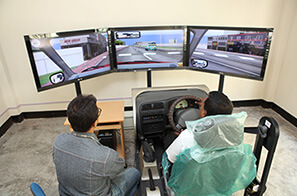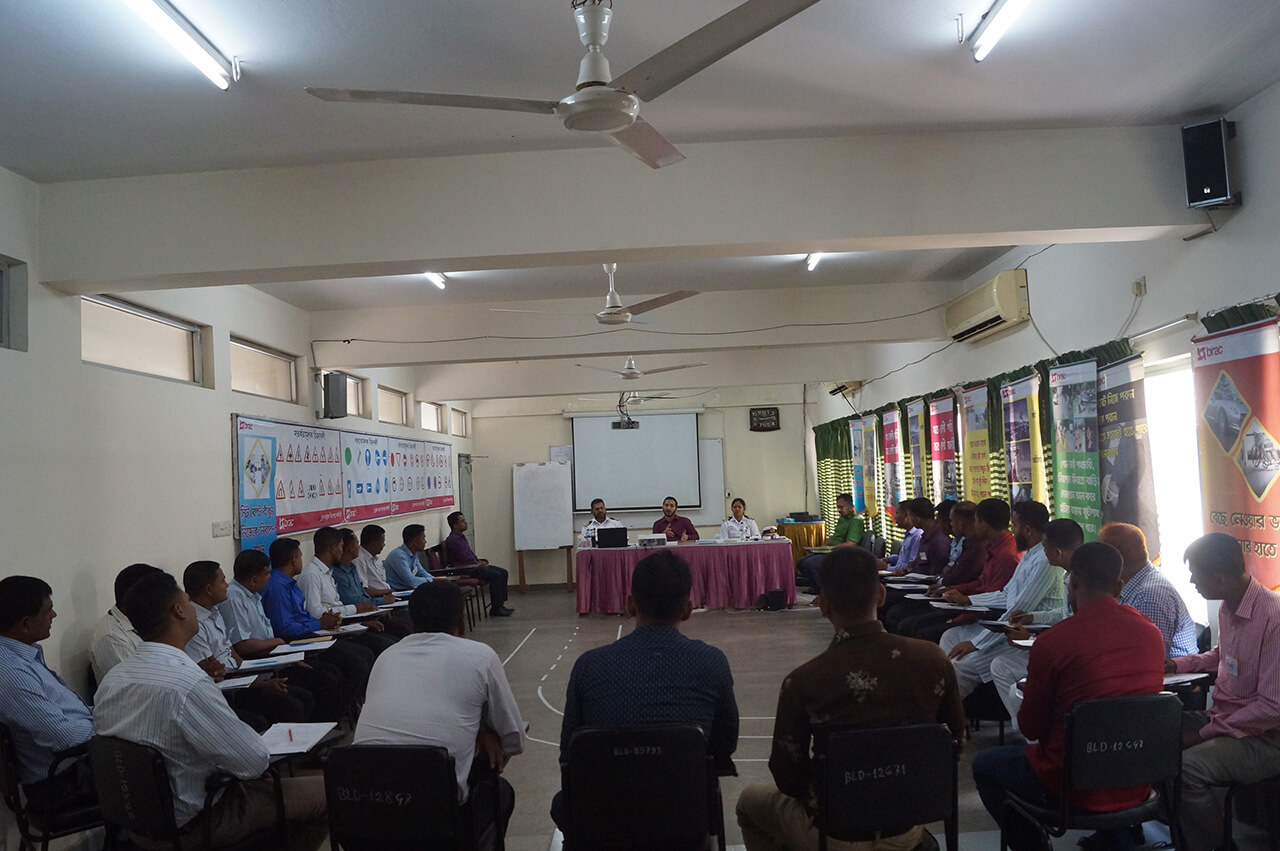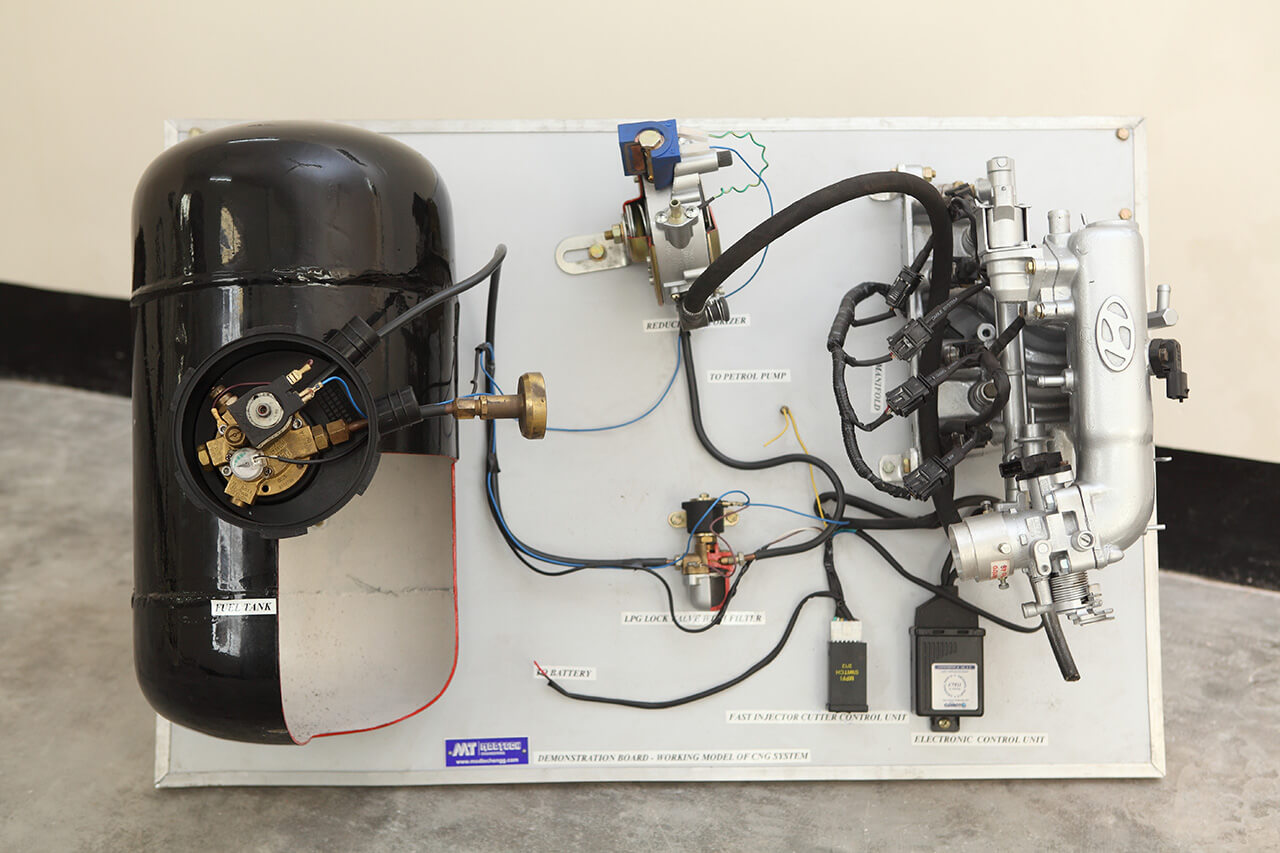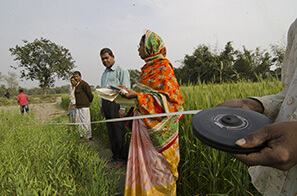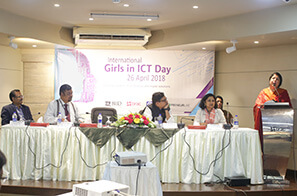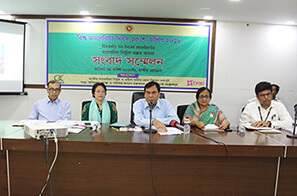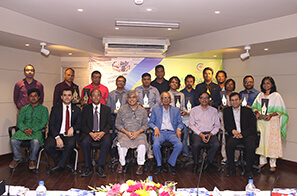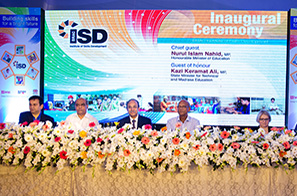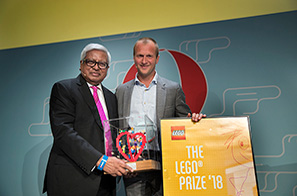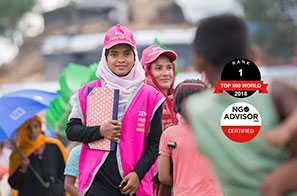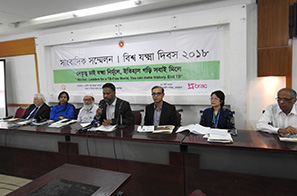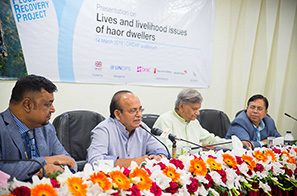
News (828)
BRAC provides safe driving training for Navy personnel
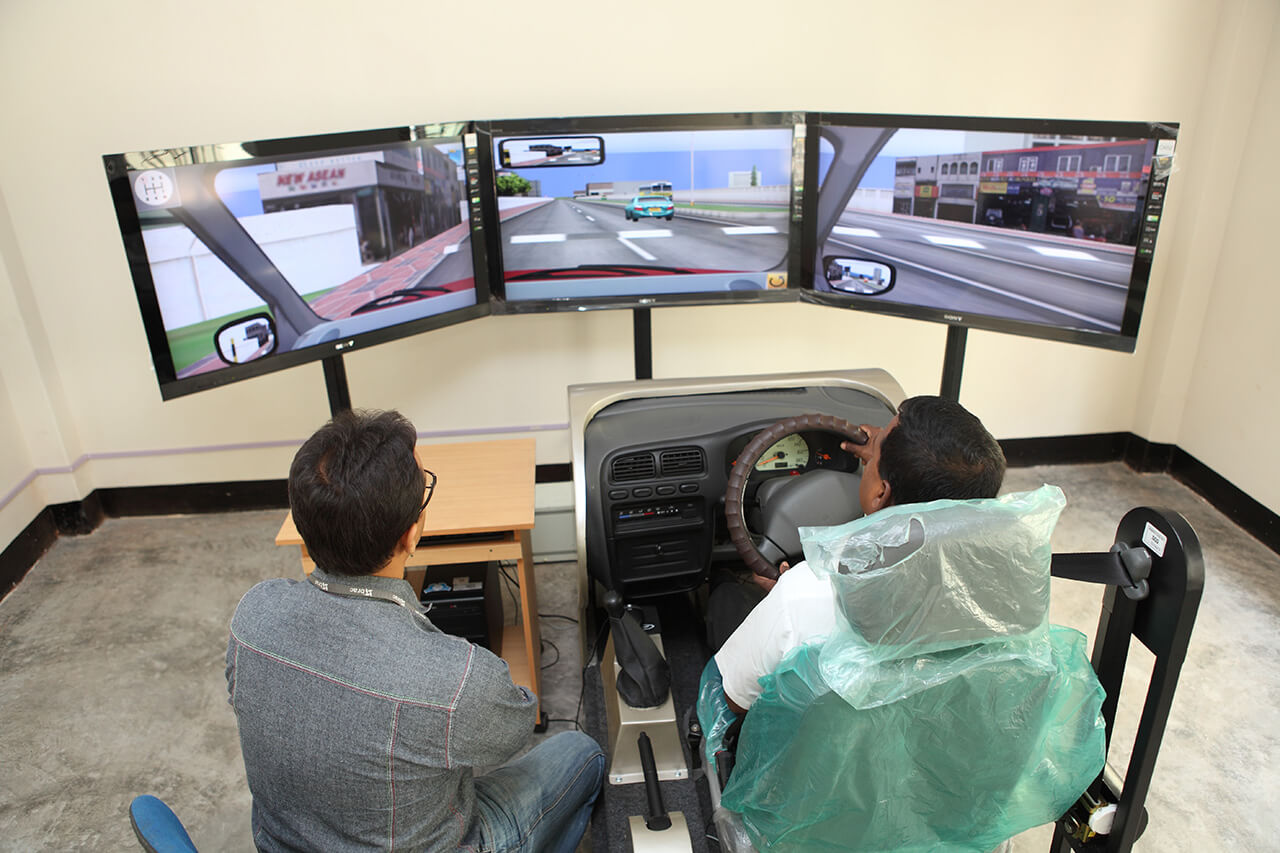
BRAC recently organised an international level training for the transport drivers of the Bangladesh Navy, focusing on awareness building and behavioural change for safe driving. 22 drivers of the Bangladesh Navy participated in the three-day-long training at BRAC's driving school in Uttara in the capital, starting on 22 April 2018.
The course appropriately combines hands-on training and theoretical knowledge with a special focus on the former.
BRAC undertook the training titled 'Road safety and safe driving training', in short 'Surokkha', in 2014, realising that raising awareness and capacity building are critical in reducing the extremely high rate of road crashes in Bangladesh. In this initiative, BRAC has partnered with Hubert Ebner Ltd, an internationally acclaimed organisation specialising in automobile driving training and road safety issues.
Trainees are exposed to lessons related to safety measures on the road, techniques on self-protection while driving, and desired behavioural change. For the practical competency part of the training, drivers are tested on their ability to operate safely through the ‘P-Drive’ technique.
Under BRAC's road safety programme, BRAC Driving School similarly trained over 1,200 individuals so far. It has been observed that drivers who underwent the 'Surokkha' training were reported to have displayed considerable change in their behaviour in adapting to safe driving techniques.
Bangladesh Road and Transport Authority (BRTA), Dhaka Metropolitan Police and Dhaka Transport Coordination Authority in a recent news report attributed over 90 per cent road crashes to rash driving. Experts stress awareness raising and capacity building for skilled, safe and responsible driving to reduce the excessively high rate of road crashes.
A discussion session also took place during the training in which Lieutenant Commander Sanjida Hossain and Lieutenant Commander M Enayet Hossain were present. The speakers at the discussion emphasised that the drivers should mindfully apply their learning in the training while behind the steering wheel.
31 million face legal issues every year, land disputes most severe
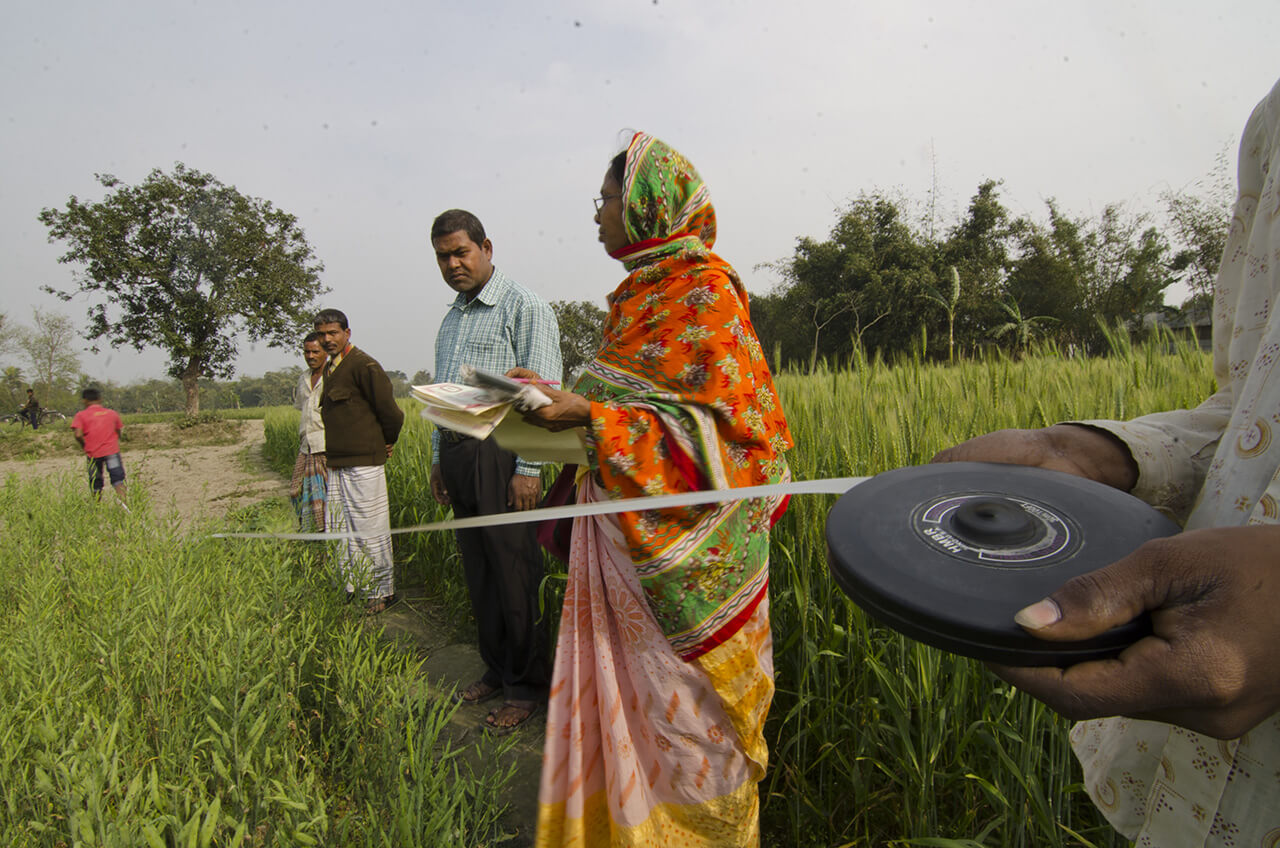
Every year in Bangladesh, 31 million people confront with legal challenges. A majority of these challenges occur when dealing with neighbours, and the most complicated ones arise when dealing with land related issues. This was among the findings presented at the launching event of the report titled ‘Justice Needs and Satisfaction in Bangladesh 2018’ at the capital’s BRAC Centre today on Wesnesday (May 9, 2018).
This research was conducted and published in collaboration between Netherlands based nonprofit The Hague Institute for Innovation of Law (HiiL), the Government of Netherlands, and BRAC. The framing questions for the research included what kind of legal dilemmas people face in Bangladesh, how they deal with those issues, who or which institutions they seek for help to resolve their concerns, and the level of responses they receive.
The study was conducted through in-depth qualitative interviews of around 6000 respondents who have randomly selected in 64 districts of the country. The study was conducted in August and September of 2017.
The chairman of the National Human Rights Commission, Kazi Reazul Hoque, was present at the event as its chief guest. Also present as special guests were the head of Measuring Justice for HiiL, Dr Martin Gramatikov, and the quantitative justice data analyst of the same organisation, Martin Kind. Programme Head of BRAC's Human Rights and Legal Aid Services (HRLS) Sajeda Farisa Kabir moderated the ceremony.
The key highlights that came out from the study include: 31 million people face legal dilemmas every year. The major types of legal issues they face include, among others, issues with neighbours (40%), land disputes (29%), criminal offences (21%), family disputes (12%), money related issues (12%), social welfare (11%), consumer problems (9%), and accidents and personal injury (8%).
In terms of the severity of the issues, land related legal disputes come out on top of the rest. The severity of the problems as reported by percentage: land disputes (25%), neighbours (22%), crime (12%), family disputes (7%), money (7%), social welfare (5%), housing (4%), and accidents and personal injury (4%).
To ensure more effective dispute resolutions and ensure better justice mechanism a number of recommendations were drawn in the report, which include among others: prioritisation of legal problems to solve them, improve information delivery, design and provide affordable and accessible justice journeys for all, explore the full potential of hybrid justice mechanisms, justice innovation and digital innovation.
Tackling multiple challenges will boost women employment in ICT
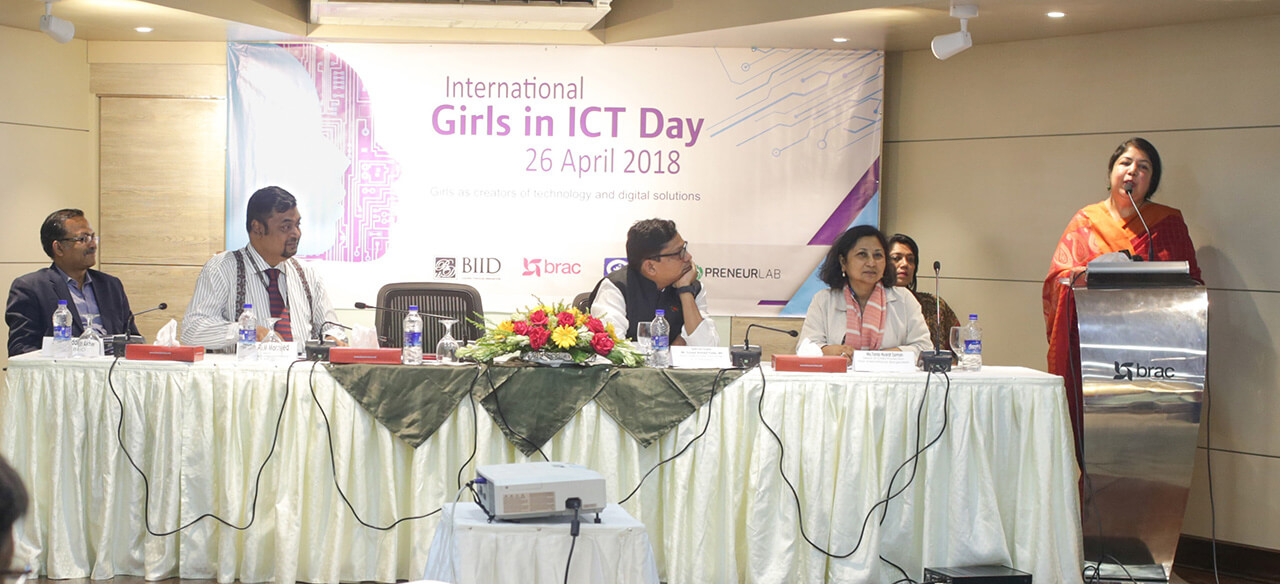
Involvement of women in information and communication technology will significantly strengthen their social and economic empowerment. It will in turn have important contribution in achieving the Sustainable Development Goals particularly the SDG-5. However, the effort to meaningfully expand women's engagement in the ICT sector entails tackling a number of challenges including social and family hurdles, lack of required knowledge and skills, lack of inspiration and fear about security in the virtual space.
These observations were made today on Wednesday (25 April, 2018) in a study presentation on the obstacles for women's participation in the information and communication sector. It was presented at a discussion organised at the BRAC Centre in the capital. Shahid Uddin Akbar, chief executive officer of the Bangladesh Institute of ICT in Development (BIID), delivered the presentation. BIID conducted the study for which 164 female students studying in different universities were interviewed.
Dr Shirin Sharmin Chaudhury, speaker of Bangladesh Parliament, was present at the event as the chief guest at the event with Zunaid Ahmed Palak, state minister for ICT and lawmaker, attending as special guest. BIID, BRAC, Plan International Bangladesh and Preneurlab jointly organised the programme on the occasion of International Girls in ICT Day to be observed on 26 April.
Tania Nusrat Zaman, head of child protection, Plan International Bangladesh, gave the welcome speech. KAM Morshed, director of Advocacy for Social Change, Technology and Partnership Strengthening Unit, BRAC, and Rabiul Alam Chowdhury, head of IT, Plan International, forwarded the recommendations to widen the scopes for women's participation in the sector.
The study observes that if women's participation in the ICT sector can be increased from the current 33.7 per cent to 82 per cent, it will result in 1.6 per cent more GDP growth. This achievement would help the country make stronger strides towards its SDG targets.
In this interview-based study three major challenges for ICT education for young women have been referred which are, bringing change in the perception of young women about ICT education, lack of knowledge and skills in ICT and lack of required skills to engage in the sector.
Dr Shirin Sharmin Chaudhury said in her speech stressed three areas of work to strengthen women's participation in ICT sector which are, undertaking focused effort to popularise the sector among women, recognise ICT as a specialised sector requiring specialised human resources and spread the message that it is a sector that will reconstruct the future.
"The government targets to ensure equal stake of men and women by 2030. To achieve the target the government has undertaken digitalisation initiatives with equal emphasis on the rural and urban areas, which will continue in future," he further said.
Emphasising IT education she suggested that 'IT scholarship' may be a convenient motivation to create awareness among students.
Zunaid Ahmed Palak said that to boost youth employment in the ICT sector the Bangladesh government will train 300 thousand youths, both men and women, by 2021. "We have reserved 20-30 per cent quota for women trainees in this initiative," he further said, pointing out that two million youth enter the country's job market every year.
Participants in the open discussion stressed updating of curriculums for ICT and digital technology education to broaden the equal opportunity space, motivating more women to actively participate in the sector and establishing women-friendly workplace.
High officials from the government and international organisations and representatives from the NGOs were also present at the event.
The International Telecommunication Union in collaboration with the United Nations has been celebrating the day on the fourth Thursday of April for some years now. Since 2011 more than 30 thousand women have been celebrating the day in 166 countries across the world.
Malaria deaths down, risks still remain in Chattogram Hill Tracks
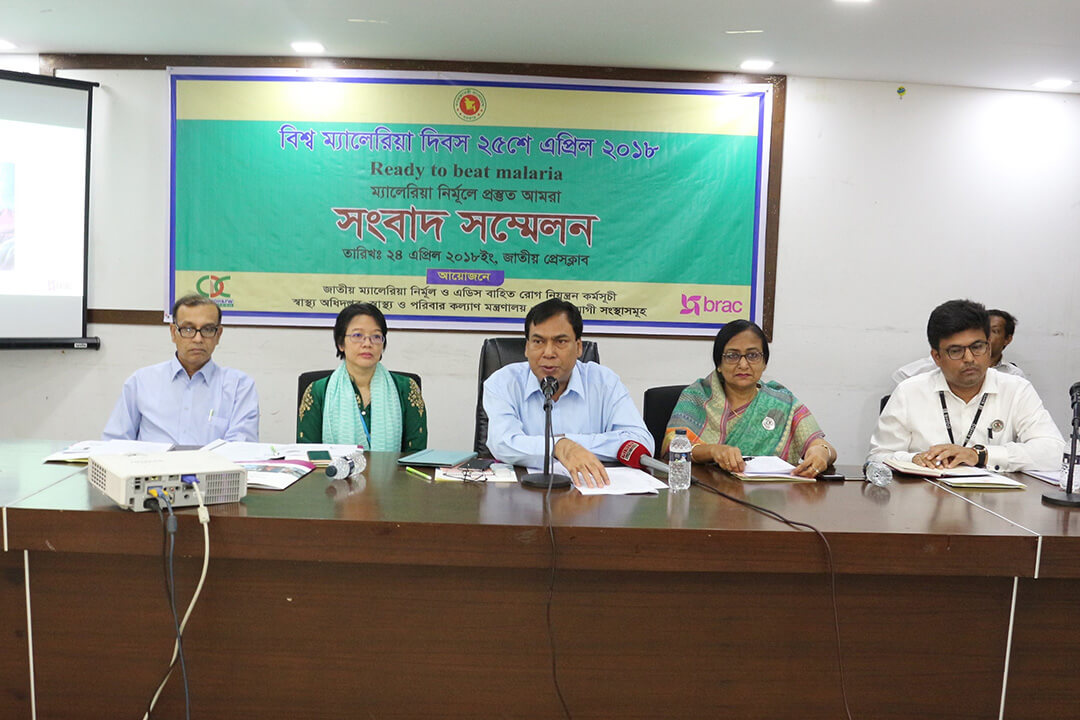
Press conference on World Malaria Day held
Three districts, Bandarban, Rangamati and Khagrachhari, are in considerable risk of malaria despite much has been achieved in checking the menace of the mosquito-borne disease. According to the National Malaria Elimination Programme (NECP), currently 93 per cent of the country's 29 thousand and 247 malaria patients are from these three districts. The major reasons for these districts to have most malaria patients are their hilly frontiers, profuse rain, large forest area, inadequacies in healthcare system and problems faced while reaching treatment and other healthcare services.
Experts revealed this information at a press conference today on Tuesday (24 April 2018) organised at the National Press Club in the capital. The government National Malaria Elimination Programme and BRAC organised the event on the occasion of World Malaria Day 2018 observed on 25 April.
The press conference was arranged to disseminate information on the future activities required to eliminate malaria, challenges in risk mitigation and recommendations as well as public awareness messages.
Director-general of the Directorate General of Health Services (DGHS) Professor Dr Abul Kalam Azad spoke as the chief guest of the event. Director of the government Disease Control unit and also line director of Communicable Disease Control unit Prof. (Dr) Sanya Tahmina, director of BRAC's Communicable Diseases, WASH and DMCC programmes Dr Md Akramul Islam, and head for its communicable diseases and WASH programmes Dr Moktadir Kabir also spoke among others.
DGHS epidemiologist Dr Md Mosiqure Rahman moderated the press conference.
DGHS deputy programme manager for malaria and Aedes transmitted diseases Dr MM Aktaruzzaman delivered the keynote presentation, highlighting the country's success in eliminating malaria.
The speakers pointed out that malaria, being one of the major public health problems of Bangladesh, plague its 71 upazilas of 13 districts, namely Rangamati, Khagrachari, Bandarban, Cox's Bazar, Chattagram, Sunamganj, Moulvibazar, Sylhet, Habiganj, Netrokona, Mymensingh, Sherpur and Kurigram.
It also mentioned that malarial deaths have much reduced lately, thanks to the collaborative efforts and effective measures by the government and non-governmental actors. While in 2014, 45 patients succumbed to the infection, in 2015 the number fell to only 9 (nine). However, 2016 saw a little rise in the number of deaths at 17, to drop again in 2017 to 13.
Professor Dr Abul Kalam Azad said, "Our goal is to eliminate malaria completely from Bangladesh by 2030. To achieve this goal we are working to prevent the disease from occurring in eight among the 13 vulnerable districts, while make sure that 51 districts are entirely free from malaria."
Prof.(Dr) Sanya Tahmina said, "We have already produced a guideline for the travellers to the hilly regions that will help reduce their risk to contract malaria." The government has also undertaken an initiative to distribute 333 thousand mosquito nets to the hilly regions and among the Rohingya people who have taken refuge in Cox's Bazar after being forcibly evicted from Myanmar, she further said.
Dr Md Akramul Islam said, "As the world's largest non-governmental actor BRAC is resolutely extending the malaria elimination programme in the camps sheltering the Rohingyas."
The keynote presentation also highlighted some of the major challenges for malaria elimination: Shortage of physicians and healthcare professionals in the remote areas limiting the capacity for treatment and healthcare service delivery, people's increased mobility, increased risk of malarial infection in the border areas and climate change impacts.
To observe World Malaria Day 2018 a parade will be organised tomorrow on Wednesday, starting from Zero Point in the capital to end at CIRDAP. A discussion session will follow at 11am at the CIRDAP auditorium. Health and family welfare minister and lawmaker Md Nasim will be present at the discussion as the chief guest.
The theme of World Malaria Day 2018 is "Ready to beat malaria".
14 journalists awarded in BRAC Migration Media Awards
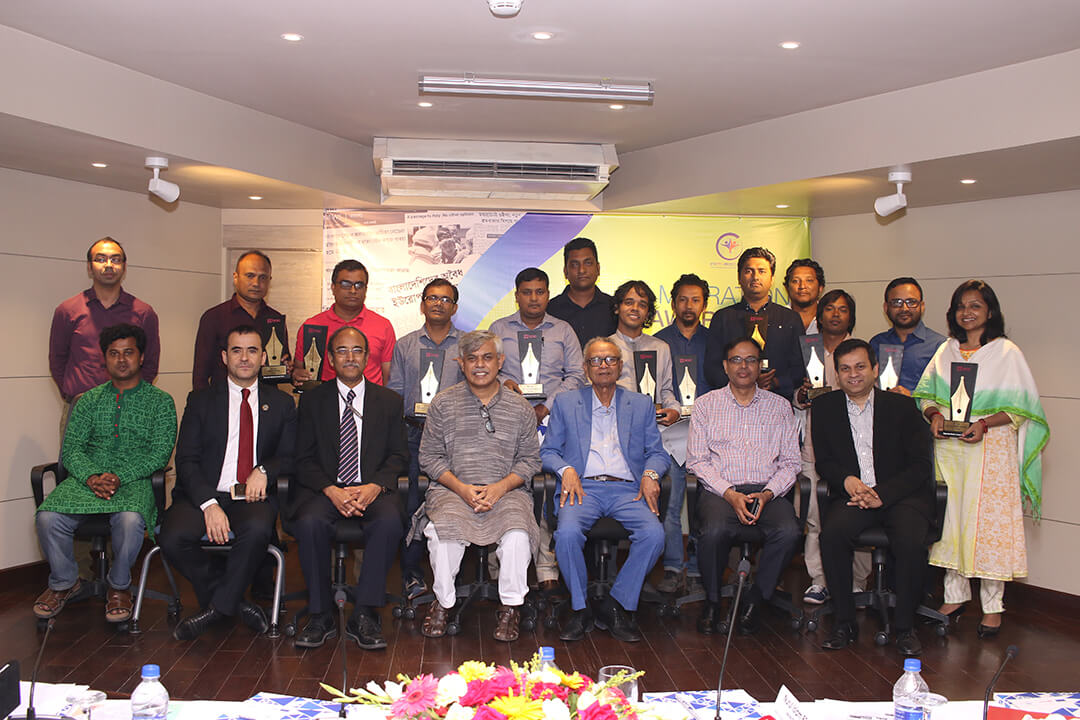
The BRAC Migration Media Award, held on 18 April, recognised the contributions made by journalists in protecting the rights of migrants and their families. The award ceremony was held in BRAC Centre, announcing winners under six categories, including national and local print newspapers, television, radio, online news sites and photography.
In the national newspaper category, the first winner was Abu Jar Ansar Uddin Ahammed of Samakal. The second prize was awarded to Adil Sakhawat from Dhaka Tribune, and the third to Muhammad Wasim Uddin Bhuiyan from New Age.
In the local news category, the winner was Md Kamrul Islam of Dainik Jalalabad. In television reporting, the first winner was Ashish Kumar Sarkar of Somoy Television, and the second winner was Jhumar Bari of Ekattor TV, and the third winner was Mashreq Rahat of Masranga Television.
In the radio category, the winner was Saleh Noman of Radio Today.
In the online news category, the first winner was Md Fazlur Rahman of Dhaka Tribune. The second winner was Md Kawsar Azam of thereport24.com, and the third winner was Jasmine Akhter of Bannernews.
For the first time, we introduced the category of photography to recognise the contribution of photojournalists. The first winner was Saiful Islam Ronny, and in second was Abdus Salam of Prothom Alo. The third winner was Mahmud Hossain Apu of Al Jazeera and Dhaka Tribune.
The Expatriate Welfare and Overseas Employment Minister, Md Nurul Islam was the chief guest at the event, while writer and journalist, Anisul Huq joined as the main speaker. BRAC’s executive director, Dr Muhammad Musa, deputy country representative of IOM, Abdusattar Esoev, director general of the Bureau of Manpower, Employment and Training (BMET), Md Selim Reza, BRAC’s senior director, Asif Saleh, and head of BRAC’s migration programme, Shariful Islam Hasan were also present at the event.
The minister of Expatriate Welfare and Overseas Employment said, "BRAC's work in the migration sector is commendable. All the information we receive come from these journalists. This is an exceptional initiative to recognise the efforts of those journalists who cover the most urgent issues on migration. We are all working so that people can go abroad safely and properly.”
Journalist and writer Anisul Haque said, "Today there are more than one billion people abroad. More people will go abroad in the next few years. Expatriate income is now the biggest driving force in the economy of Bangladesh." Regarding the role of journalists, he said, "The media is working towards creating awareness, as well as contributing towards reshaping policies."
The director general of BMET, M Selim Reza said, "We are now focusing more on the skills of migrants. The demand for Bangladeshi workers abroad is also increasing.”
The deputy country representative of the International Organisation of Migration, Abusattar Esoev said, "We are working in cooperation with the government and non-government organisations, such as the United Nations immigration agency. This cooperation will continue.”
Asif Saleh, BRAC’s senior director said, “We can ensure good governance in this sector if the government and non-government organisations work together in alliance. We can send people abroad in a safe and efficient way.”
Presenting the keynote paper on the role of media in protecting the rights of immigrants was Shariful Islam Hasan, head of BRAC’s migration programme.
Professor Robayet Ferdous of the Mass Communication and Journalism Department of Dhaka University was present on this occasion, along with KM Ali Reza, deputy head of Expatriate Welfare and Overseas Employment Ministry; Shahnaz Munni, chief news editor of News24; photojournalist Pavel Rahman, and Sarwat Binte Islam, senior programme manager of Manusher Jonno Foundation.
BRAC-ISD commences journey to improve employment opportunities
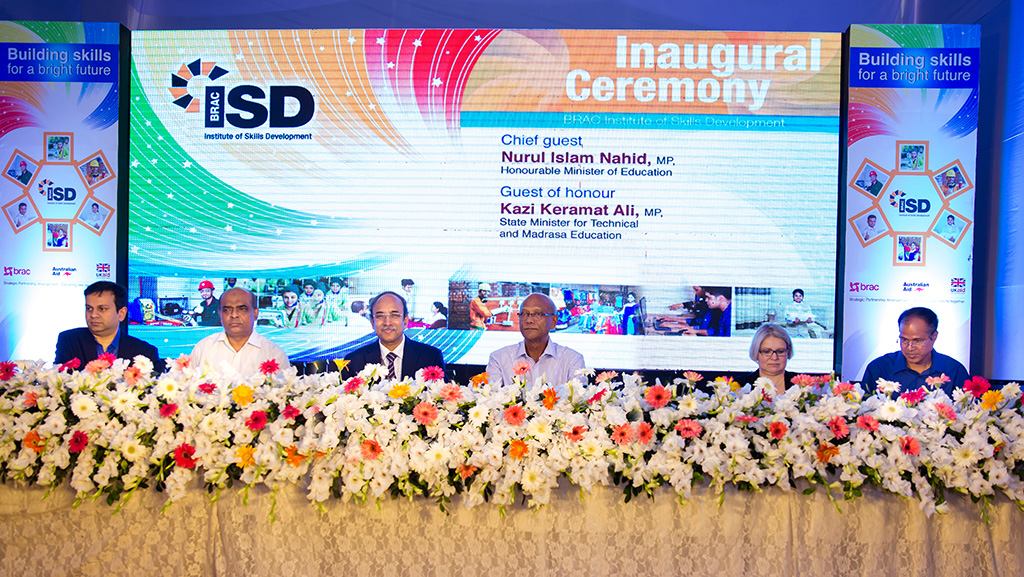
Focus on building skills workforce to achieve SDG target
Nearly 87 percent of the country’s total workforce are involved in farming, small businesses and other forms of informal occupation. A large segment of the workforce is not being properly utilised in the skilled sectors. Many of these people are unable to enter the formal employment sector due to a lack of demanded professional skills and knowledge. This is a considerable barrier for the entire country in terms of meeting the Sustainable Development Goals.
These insights were revealed at the inauguration ceremony for BRAC Institute of Skills Development held in the capital’s Uttara area today, 10th April 2018. The Honourable Minister of Education, Nurul Islam Nahid MP inaugurated the event as the chief guest.
Among the other guests present were Alfaz Hossain, Project Director at the Bureau of Non-Formal Education, ABM Korshed Alam, Chief Executive Officer of National Skill Development Council Secretariat, Beatrice Kaldun, Head of UNESCO Dhaka Office, Dr. Muhammad Musa, Executive Director of BRAC. BRAC’s Senior Director for Communications, Strategy and Empowerment, Asif Saleh, gave presentation on the skills context in Bangladesh.
It was mentioned in the presentation that more than 2 million people are entering the workforce every year in Bangladesh. The number of people readily seeking employment is estimated to rise up to 76 million by the year 2025 in Bangladesh. With almost 60 percent of the current population entering the workforce being 30 years and younger, close to 40 percent of these young people are being left unskilled and unemployed. To tackle these issues with innovative and impactful interventions, BRAC launched the Skills Development Programme in 2015. BRAC Institute of Skills Development is starting its journey as an extension and scaled up model of the programme.
BRAC-ISD provides market driven skills training covering a wide range of sectors – from information technology to hospitality and tourism. Learners receive certification that is nationally accredited by the Bangladesh Technical Education Board as well as internationally by City & Guilds. After graduating, BRAC-ISD also supports its learners to secure full-time employment.
Outside of Dhaka, BRAC-ISD operates training centres in Narayanganj, Pabna, Manikganj, Rangpur, Magura, Cumilla, Cox’s Bazar and Chattogram.
Nurul Islam Nahid MP said, "education is our utmost priority. But technical skills education also needs considerable attention. However, a big challenge in this field is changing social perceptions surrounding it. Most of our people strongly hold the belief that acquiring a higher education degree is the gold standard to landing decent employment. Some of the other barriers to proliferation of skill based education include interest from women to get involved and shortage of trained instructors."
He also added, "currently we have 49 polytechnic colleges across the country that offer four-year long programmes. With the aim of enhancing skilled workforce, the Government is also planning to establish 38 more polytechnic institutes." The Minister stressed on the fact that institutional training should focus more on modern methods instead of outdated practices.
Beatric Kaldun stated, "A significant emphasis is being placed on creating long-term decent employment opportunities to meet the targets set in SDG 8. From today's discussion it is clear to me that a large portion of people in Bangladesh entering the workforce are below 30 years of age. It is not enough to just give them skills training, but rather to ensure that the training given fulfills the needs of the market."
Dr. Musa also emphasised on improving the skills development scenario and better quality training to ensure greater opportunities both locally and abroad.
To know more about BRAC ISD click here.
Sir Fazle Hasan Abed awarded the 2018 Lego Prize
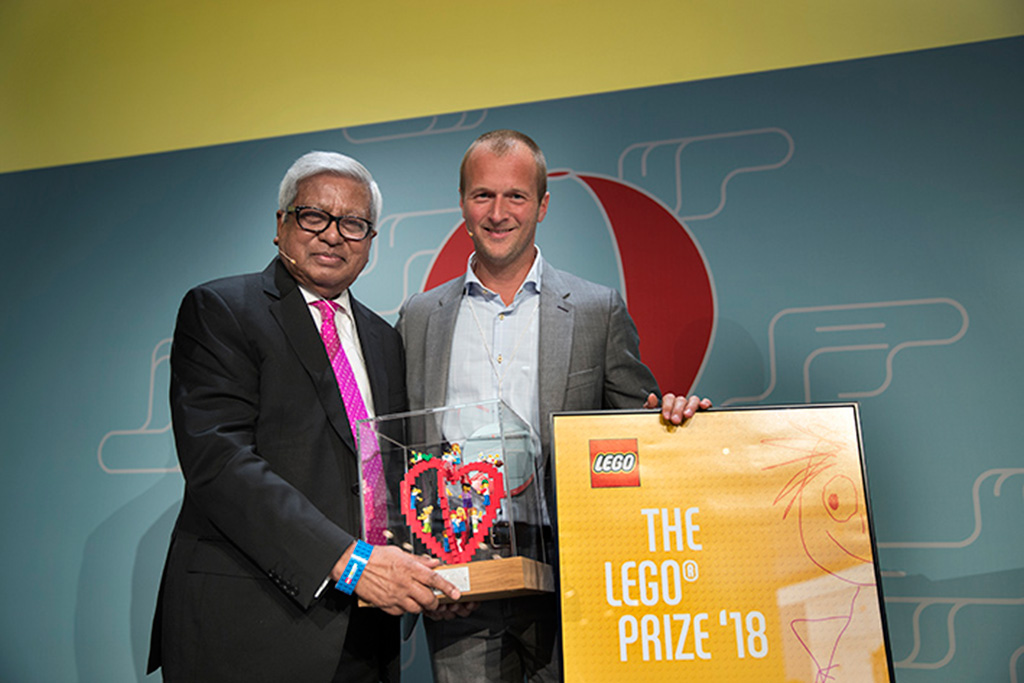
Sir Fazle Hasan Abed, founder and chairperson of BRAC, has been awarded the prestigious 2018 LEGO Prize in recognition of his extraordinary contribution towards improving children's lives and their opportunities to play, learn and develop.
Thomas Kirk Kristiansen, chairman of the board of Lego Foundation, handed over the prize to Sir Fazle at an event last evening (Tuesday 10 April 2018) in Denmark.
The LEGO Foundation, a Danish corporate foundation, has been awarding this prize since 1985 to individuals and organisations who are committed to the lives of children and are champions of learning through play.
The prize is accompanied by a cash award of USD 100,000, which will be used to strengthen BRAC’s support for children living with neuro-developmental disabilities and their families.
From the beginning of his career and the establishment of BRAC, Sir Fazle has viewed education as a crucial catalyst for change. He firmly believes that it is about more than just schools and books, and constant innovation is a cornerstone of BRAC’s approach. Since launching its non-formal education programme in Bangladesh in 1985, more than 11 million children have graduated from BRAC’s primary and pre-primary schools.
BRAC has set up more than 1,400 play-based early childhood development centres across Bangladesh, Tanzania and Uganda, where close to 40,000 children aged 1 to 5 years are presently enrolled. Of these, some 1,200 centres known as 'Khelar Jogot' (‘World of Play’ in English) are in Bangladesh. In these centres, pre-school children have access to age-appropriate play materials, a play-based curriculum, and play spaces that ensure their holistic development.
“It is an honour to receive the esteemed LEGO Prize. Every child deserves the opportunity to grow and develop. This generous financial contribution will support the holistic development of an underserved group of children in Bangladesh with special needs,” said Sir Fazle Hasan Abed.
“At BRAC, we pride ourselves on taking an innovative approach to early childhood development and education and share the LEGO Foundation’s passion for learning through play. Through our Play Lab programme, we have seen first-hand the power it can have in a child’s development,” he added.
Finnish educator and scholar Pasi Sahlberg, educationist and president of Reggio Children Carla Rinaldi, and founder of Right To Play International Johann Koss are among the earlier winners of the LEGO Prize.
In addition to its early childhood development centres, BRAC operates some 10,000 pre-primary schools, 3,200 non-formal primary schools, 8,700 primary schools, and a university. BRAC also provides technical support to 3,846 primary schools.
BRAC ranked top global NGO of 2018
BRAC tops NGO Advisor’s list of the best non-governmental organisations in the world for the third year running.
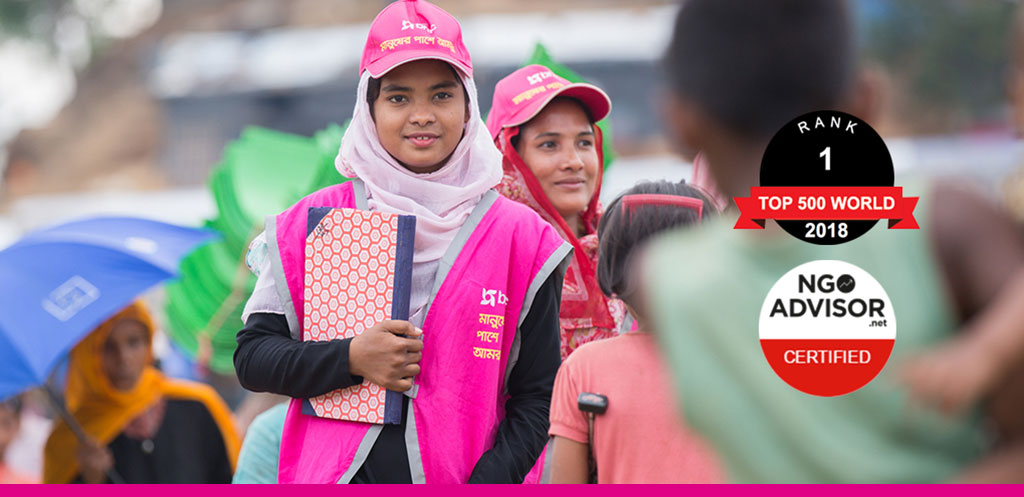
BRAC, an international development organisation and global leader in developing cost-effective, evidence-based programmes in conflict-prone and post-disaster settings, was today ranked the number one NGO in the world for 2018. The ranking was done by NGO Advisor, an independent media organisation based in Geneva. BRAC took the top spot for the third year in a row as part of the 2018 Top 500 NGOs World rankings.
“We are deeply honoured to be ranked as the Top Global NGO for the third consecutive year,” said BRAC Founder and Chairperson, Sir Fazle Hasan Abed. “This accolade belongs to all BRAC staff for championing the BRAC values of integrity, innovation, inclusiveness and effectiveness in everything we do. Our 110 million plus programme participants worldwide, who play an active role in their own transformative journeys, are the real winners. We are inspired by their resilience and spirit to continue striving for a just and equitable world.”
NGO Advisor releases the Top 500 NGOs World rankings each year to highlight outstanding organisations in the nonprofit sector. It conducts exhaustive research, evaluates hundreds of NGOs against a rigorous set of criteria, and ranks these organisations according to a robust methodology. This marks the fourth time in five years that BRAC has earned the number one ranking.
“For any organisation to be a part of the top 100, not to mention the top ten, they need to score strongly in the three pillars of our methodology: innovation, impact, and governance. BRAC continues to chart new territory in all three, pioneering creative, cost-effective, and sustainable interventions that reach millions of the most vulnerable people worldwide,” said NGO Advisor Editor-in-Chief Jean-Christophe Nothias in a statement.
BRAC is one of the few development organisations based in the global south that operates worldwide. Founded in Bangladesh in 1972 and today active in 11 countries, this distinct perspective ensures success for an organisation that runs programmes in microfinance, education, healthcare, legal rights, girls’ empowerment, and agriculture; socially responsible businesses; a bank; a university; and one of the world’s largest mobile money platforms, bKash.
BRAC has an annual global expenditure exceeding $1 billion. The organisation is also unique in that the majority of its programmes are self-financed. In Bangladesh, more than 75 percent of its budget comes from its own social enterprises. In 2017, this was a key determinant for NGO Advisor, which noted this innovative cost-recovery model and focus on sustainability.
“Dynamism is one of our core strengths,” said Dr. Muhammad Musa, Executive Director of BRAC. “BRAC goes beyond the traditional NGO definition and has a unique, integrated model to drive positive social change, including development programmes, social enterprises, investments and university. 2017 has been a landmark year for BRAC as we have also extended our work in humanitarian crisis management to support almost a million Forcibly Displaced Myanmar Nationals, or Rohingyas, coming into southern Bangladesh. We will continue to evolve and focus on a humanitarian development approach, to maximise the impact for both displaced people and host communities. In the long run, we aim to leverage our expertise to support people in crises anywhere in the world."
BRAC is ranked alongside NGOs at the forefront of the international development sector, with Médecins Sans Frontières, also known as Doctors Without Borders; the Danish Refugee Council; the Skoll Foundation and Ashoka, both of which support and enable social entrepreneurship worldwide.

80% TB patients remain undiagnosed
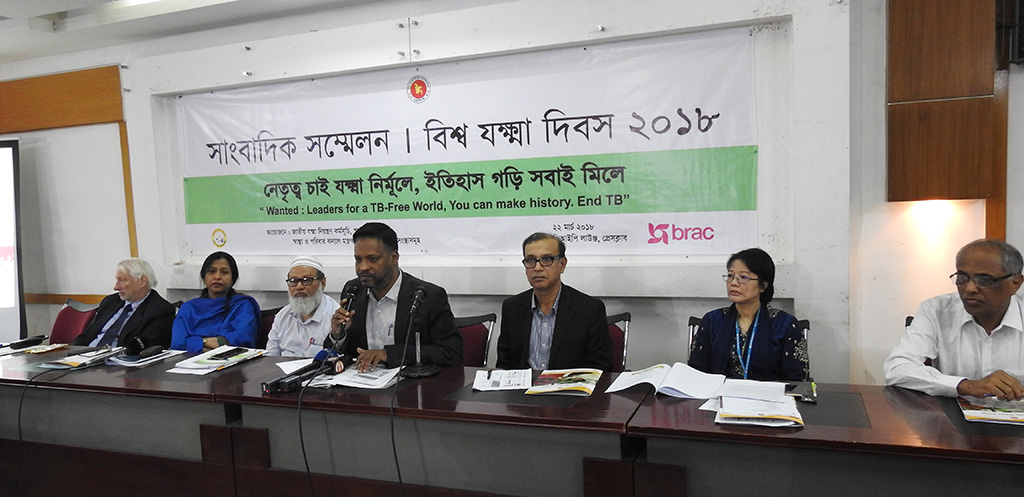
Although the government's overall success continues in tuberculosis treatment, control of multi-drug resistant TB or MDR TB remains a major challenge, mainly due to complications in diagnostic process. Still now, Estimated 80% of the patients with MDR TB infection cannot be diagnosed. Moreover, treatment cannot be reached to 33 per cent patients contracting any kind of TB. However, despite there are diagnostic problems, treatment success for pulmonary TB in the country is as high as 95 per cent.
Experts revealed the information at a press conference today on Thursday (22 March 2018) at the National Press Club. Health and family welfare ministry, National TB Control Programme (NTP) and BRAC organised the event on the occasion of World TB Day to be observed on 24 March.
Dr Md Abul Khair Basher presented the keynote paper at the press event. NTP Medical Officer Dr Nazis Arefin Saki gave a presentation on the NTP management, while its Monitoring and Evaluation Expert Dr Ahmedul Hassan Khan gave the welcome speech. NTP line director Professor Dr Samiul Islam moderated the question and answer session with the press.
Among other guests present at the press conference were World Health Organisation Medical Officer Mya Sapol, National Anti-tuberculosis Association of Bangladesh (NATAB) president Mozaffar Hossain Paltu, USAID Senior Adviser for infectious diseases Dr Charles Lerman, International Centre for Diarrhoeal Disease Research, Bangladesh scientist Dr Sayra Banu and BRAC Director Dr Md Akramul Islam.
Speakers mentioned shortage of GeneXpert machines used for MDR TB detection as a major hindrance in this regard. Lack of awareness and length of MDR TB treatment duration are also important factors for many not completing the full treatment course.
According to the NTP, 2 lakh 44 thousand and 201 patients were detected with TB and received treatment in 2017 through this government entity. Of them, 10 thousand and 189 are less than 15 years old. Further, 12 patients have been diagnosed as extensively drug resistant (XDR).
The keynote speech stressed that in Bangladesh 221 individual’s contract TB infection every year and 40 die of the infection (Global TB report 2017). The statistics itself highlights the urgency of deploying sufficient equipment as well as strengthening the mass awareness campaign in this regard.
Professor Dr Samiul Islam said the country's success in diagnosing and treating tuberculosis between 1993 and 2018 bears the evidence of the achievement of the National TB Control Programme. Under NTP, the rate of diagnosis is 77 per cent per one lakh population and that of recovery 95 per cent per one lakh.
He further said that despite the success Bangladesh is still one of the 30 countries most vulnerable to this infection. He called for all to work unitedly to free the country from TB.
Mya Sapol stressed collaborative effort between the government and the non-governmental sector in controlling TB.
Dr Md Akramul Islam called on the mass media to play a stronger role in TB control campaign through dissemination of information about the efforts undertaken at both the government and the non-governmental level. He further said, prevalence of TB infection is high among urban and elderly population. Giving special emphasis on urban TB control he said, this initiative are under expansion in the slums among floating population, industrial areas, prisons and private sector.
The speakers also highlighted a number of challenges in controlling TB, which include constraints in diagnosing child TB, increase in urban TB prevalence among elderly and workplace people, shortage of GeneXpert machines and lack of human resources in diagnostic activities, lack of involvement of the private sector, and diagnosis yet to be made compulsory in the treatment regimen.
This year's slogan for World TB Day is “Wanted: Leaders for a TB-Free World. You can make history. End TB”
Research report presented on life and livelihood issues of haor dwellers
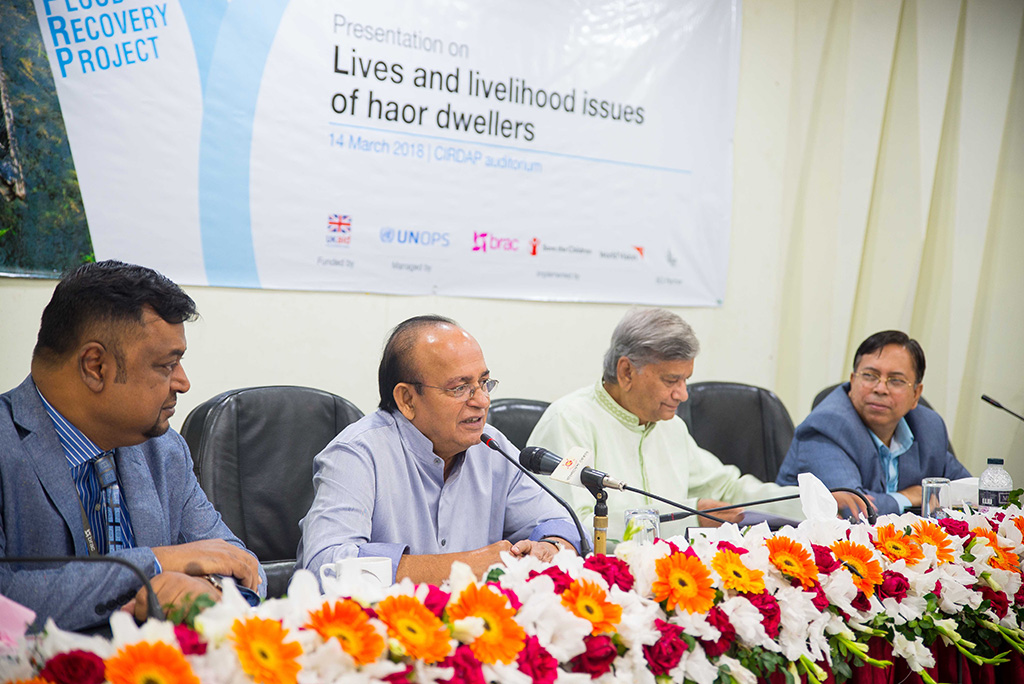
Improved early warning system, long-term farming plan, embankment construction and repair and alternative employment stressed
Establishment of manufacture plants to create alternative employment opportunity, assistance for women entrepreneurs and effective measures to prevent and control river erosion include the essential measures for the development of the people haor areas in the north and northeast of Bangladesh.
The speakers stressed these points at a presentation event on a research titled 'Lives and livelihood issues of haor dwellers' organised at the CIRDAP auditorium in the capital today on Wednesday (14 March 2018). Probal Saha, water resource management specialist of the Centre for Climate Change and Environmental Research (C3ER), delivered the keynote presentation at the programme. The C3ER, a research body under BRAC University, carried out the research.
Water resources minister and lawmaker Anwar Hossain Manju attended the event as the chief guest, while state minister for finance and planning and lawmaker Muhammad Abdul Mannan was present as special guest. Moderated by BRAC Advocacy for Social Change programme's director KAM Morshed, the event was addressed by among others, senior secretary of water resources ministry Dr Zafar Ahmed Khan, Save the Children deputy country director Dr Ishtiaq Mannan, Integrated Development Programme's head Shyam Sundar and World Vision's humanitarian and emergency affairs director Dolon Josef Gomes.
C3ER conducted the study between 7 February and 15 March this year under the 'Flash flood recovery project'. BRAC, Save the Children and World Vision International are implementing the project with funding from the UKAID and managed by the UN office for the project services (UNOPS). The project was undertaken last year (2017) in the context of flash flood in the vast haor areas, severely affecting the life and livelihood of the local community.
The study was conducted among nine communities in three upazlias of two districts which are: four communities of Tahirpur upazila and three communities of Dirai upazila, both under Sunamganj and two communities of Itna upazila of Kishoreganj district. The study followed mainly a qualitative methodology in which 126 community members and 9 (nine) representatives of the local government bodies took part.
The participants mostly emphasised creation of alternative employment opportunities as an urgent measure to tackle the crisis of lack of employment in the vast haor area. Their suggestions in this regard include establishment of manufacturing units and support to promote entrepreneurship among women through training and materials such as sewing machines. They also identified a faulty market management system as a major impediment for the farmers not being able to sell their farm produces.
The study recommendations include among others, low-interest bank loans for the haor dwellers, construction and repair of embankments, long-term planning to boost agricultural production, opening 'jolmohal' (water-bodies under government jurisdiction that are leased out for fish culture) for affected people during emergencies of flash floods and other natural disasters allowing them to catch fish, and technological improvement of early warning system in weather forecast.
The water resources minister, Anwar Hossain Manju, said at the programme, 'The haor areas are affected by a complicated set of problems that cannot be solved all in one go. To effectively address the problems they need to be prioritised. Since we have resource constraints, we cannot prevent erosion in all rivers, nor can we dredge all the rivers. However, under the guidance by the honourable prime minister we are giving special priority to river dredging.'
He further stressed collaborative effort, saying, 'We would have achieved GDP growth 10 times more if we could work in coordination at all levels, including districts and unions. And, if we could prevent "wastage", which however is termed "corruption" by many, there was GDP growth 2 times more.'
State minister for finance and planning Muhammad Abdul Mannan said, 'I have much doubt about the sustainability of the crop insurance in the haor area. It is because, an insurance means that the clients will have to pay the premiums. So we have to think more how realistic option the crop insurance would be for the poor farmers of the haor.'
Dr Ishtiaq Mannan said, 'Time is extremely valuable in haor livelihood management. Resource damage cannot be prevented unless we are able to take timely action. For this involving the local community is essential for effective infrastructure management in haor.'
Join the world’s biggest family

